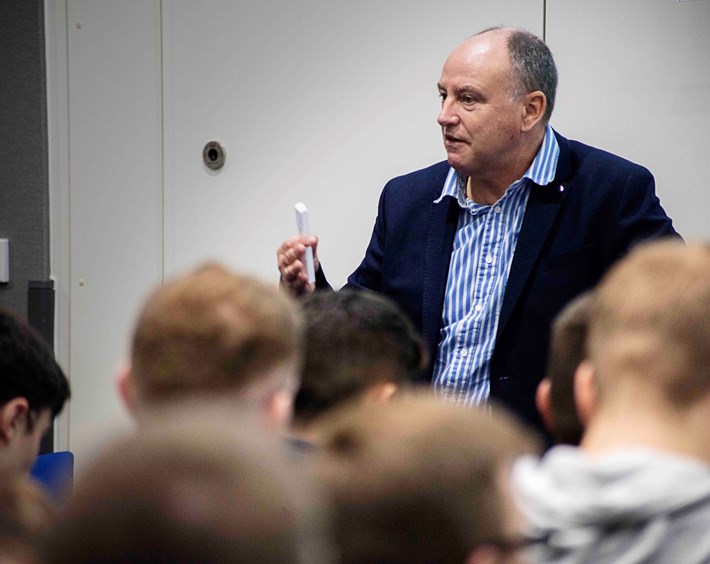Looking to start this September? It’s not too late to score your dream career – Apply through Clearing today and begin your studies at UCFB!
Degree overview
Football is a multi-billion-pound global industry. With its revenue driven by the marketing of its products and services, competition amongst brands is fierce and qualified professionals are in high demand.
On this degree you will gain an understanding of football business and be introduced to concepts such as business models, management, business planning and return on investment by our expert academics.

Degree content
Your studies will focus on the core functions of football business management accompanied by marketing modules.
The marketing pathways explore the principles of marketing and communications and apply theory to live projects to develop your employability skills.
You will gain an understanding of football business and be introduced to international business models and management concepts, business planning, return on investment, strategy integration, contemporary issues and digital marketing.
You will plan, implement and evaluate digital marketing plans for an industry organisation.
Teaching locations for this degree include:
In addition to our teaching locations, we also use specialist facilities throughout the academic year as well as additional facilities where required.

I was able to achieve things beyond my imagination whilst at UCFB because I was learning about something I cared about and had lecturers around me who had both knowledge and experience in the industry.
Modules
- Skills for Learning
- Mental Wealth
- Research Project
- Contemporary Issues in Sport
- Managing Football Operations and People
- Introduction to Business and Management (Sport and Football)
- Understanding the Business of Football
- Principles of Marketing
- Integrated Marketing Communications
- Understanding Sports Fan Behaviour
- Data Analytics
- Industry Competencies (Mental Wealth)
- The Organisation and Market of World Football
- Theory of Digital Marketing
- Research Methods
- Practice of Digital Marketing
- Stadium and Event Organisation
- Industry Readiness (Mental Wealth)
- Strategic Management
- Football Brand Management
- Professional Project
- Global Marketing Management
- Industry Engagement (Mental Wealth)

University Campus of Football Business is an embedded college of the University of East London. From September 2021 onwards all graduates will receive a degree from the University of East London.
Click here to download the course specification
- QAA Subject Benchmark Statement for Business and Management (2019)
Visit the QAA website to access each of these benchmark statements.
Entry requirements
- UCFB Wembley course code: FMAF
- Institution: U10
- Campus: W
- UCFB Manchester Campus course code: FMAF
- Institution: U10
- Campus: E
- 64 UCAS tariff points or equivalent non-tariff qualifications
- GCSE Maths and English Language (Grade C/4 or above) or equivalent e.g. Functional Skills Level 2
- International applicants will be asked to pass the Academic IELTS test with a minimum overall score of 6.0 and no less than 5.5 in each of the four elements
All applications are reviewed on a case by case basis. If your academic achievements do not meet the minimum level required but you have considerable professional experience, please contact admissions@ucfb.com.
Please be aware that all applicants who do not hold British or Irish nationality will require a visa to study in the UK
Our access to a UK Government Student Visa licence is currently being reviewed. This means we are unable to consider applications from any applicant who would require a student visa to study in the UK as we cannot issue a Confirmation of Acceptance for Studies (CAS).
If you are unsure whether you would need a visa to study in the UK, or for more information, please contact compliance@ucfb.com.
If you don’t hold a visa for the UK and would still like to study with UCFB, please consider Football Coaching (Distance with Attendance).
- UCFB Wembley course code: FMA1
- Institution: U10
- Campus: W
- UCFB Manchester Campus course code: FMA1
- Institution:U10
- Campus: E
- 96 UCAS tariff points or equivalent non-tariff qualifications
- GCSE Maths and English Language (Grade C/4 or above) or equivalent e.g. Functional Skills Level 2
- International applicants will be asked to pass the Academic IELTS test with a minimum overall score of 6.0 and no less than 5.5 in each of the four elements
All applications are reviewed on a case by case basis. If your academic achievements do not meet the minimum level required but you have considerable professional experience, please contact admissions@ucfb.com.
Please be aware that all applicants who do not hold British or Irish nationality will require a visa to study in the UK.
Our access to a UK Government Student Visa licence is currently being reviewed. This means we are unable to consider applications from any applicant who would require a student visa to study in the UK as we cannot issue a Confirmation of Acceptance for Studies (CAS).
If you are unsure whether you would need a visa to study in the UK, or for more information, please contact compliance@ucfb.com.
If you don’t hold a visa for the UK and would still like to study with UCFB, please consider Football Coaching (Distance with Attendance).
We accept applications with advanced standing via our Advanced Prior Learning (APL) application process. Should you wish to apply for direct entry into Year 2 or Year 3 of one of our undergraduate degree programmes, you will be required to complete an APL application form and provide us with evidence of your previous studies.
Please contact admissions@ucfb.com for further detailed guidance. Please note that should you wish to apply via this process, we strongly encourage you to begin the application process early in the cycle and you will still be required to complete a UCAS application.
All applications for an undergraduate degree programme are submitted via UCAS. To apply, please visit UCAS.com.
Career prospects
Football is a multi-billion-pound global industry driven by the marketing of its products and events. The emergence of digital platforms has provided football organisations with the tools to reach a range of stakeholders on a local and global scale, with it coming a huge variety of professional roles within the game including marketing manager, football analyst, club welfare officer, commercial executive, CRM manager, partnerships executive and programme administrator.

Over 90% of UCFB graduates are in employment within six months of graduating and almost two-thirds of them work within the global sports industry.
At UCFB we bridge the gap between education and business, allowing a unique approach to education. We provide two curricula; the academic curriculum which encompasses exams and coursework and the Employability & Career Planning programme – a three year journey of professional and personal development.
This provides access to best-in-class industry guest speakers, additional qualifications and exceptional opportunities to apply for work experience placements to ensure our students graduate as well-rounded, empowered professionals.
Find out more about your career journey at UCFB

Each of our UCFB undergraduate degrees is underpinned by an embedded strand of learning and skills development, including a formalised a short work-placement opportunity, to better equip students for the 21st century workplace and enhance employability opportunities.
This allows students to develop a set of key transferrable skills to ensure they are ready for the modern workplace when they graduate, including emotional, social, physical, cultural and cognitive intelligence, digital proficiency, industry and community connections, and giving back to the community through projects and volunteering.
Every UCFB degree has one Mental Wealth module in each academic year to cover these skills, and our learning outcomes for all modules are closely mapped to these same competencies in order to maximise graduate's industry readiness and career opportunities.
UCFB graduate Manfredi Miyashita works for Mughoot – a creative agency specialising in sports marketing and communications.
Read more
Saad Wadia is one of the Co-Founders and Directors of Avalon Sports Group – a London-based consultancy for business in sport, athletes and those looking to expand their market through social influencers. He founded the company with fellow UCFB graduates Raj Shah and Lorenz Essing.
Read more
Visit our dedicated page about fees and student finance.
Tuition fees for international students are £14,950 per year. To apply to UCFB directly, you will need to use our UCFB applicant portal.
The provision of a facility or service including accommodation may be subject to an additional charge (i.e. separate from tuition fees). Where this is the case, we will make this clear in advance and payment for such service shall be made in accordance with any additional contract made between you and the University.
In some instances, optional activities provided by UCFB may carry an additional cost for participants (e.g. qualifications with external certification such as FA Coaching Badges). Any additional costs will be provided to students in advance of any such sessions running.
UCFB has a range of scholarship and bursary options to help with the cost of studying and to encourage students to embrace their time at UCFB and graduate with more than just their university degree. Click here to learn more.


UCFB provides an exceptional environment to live and learn in, with state-of-the-art facilities in two inspirational campuses in London and Manchester.
Find out more
















